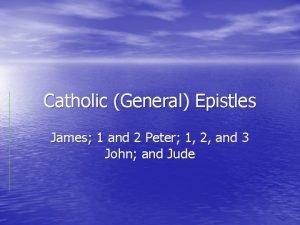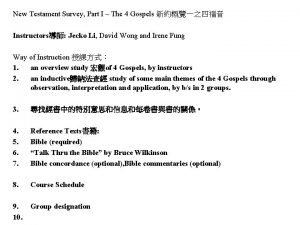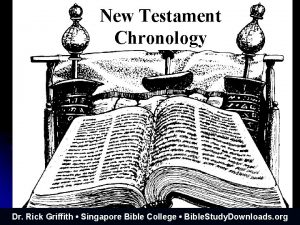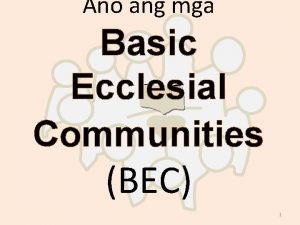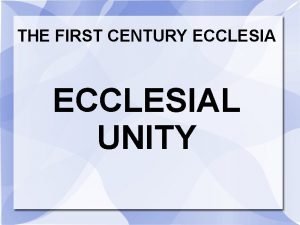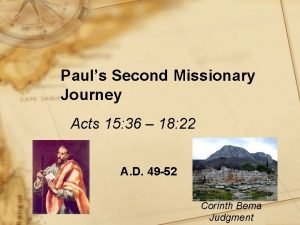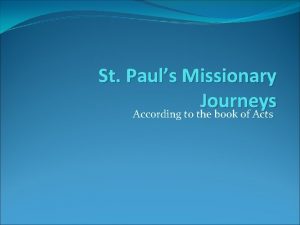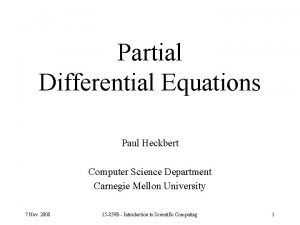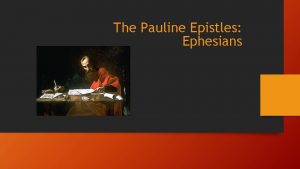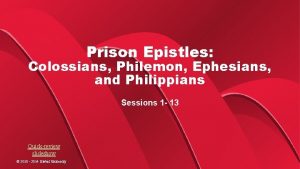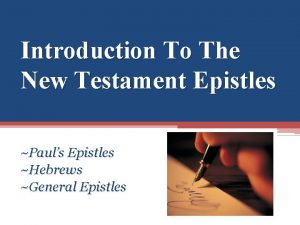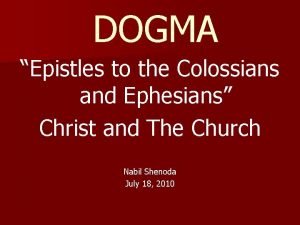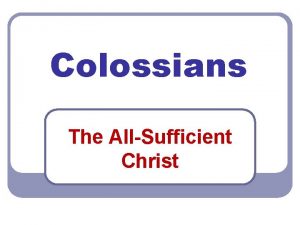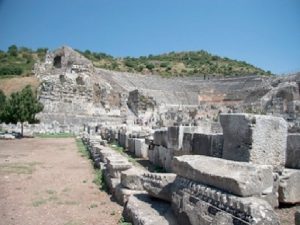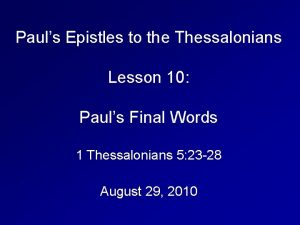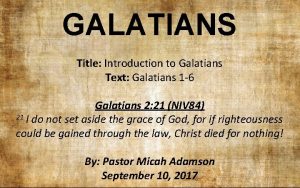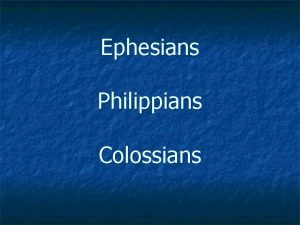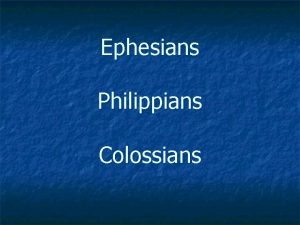PAULS ECCLESIAL EPISTLES Galatians Ephesians Philippians Colossians PAULS














- Slides: 14

PAUL’S ECCLESIAL EPISTLES Galatians, Ephesians, Philippians, Colossians

PAUL’S ECCLESIAL EPISTLES Galatians– Background � There are two theories about the church in Galatia. � The first theory is that this church was established on the first missionary journey (Acts 13) � The second theory argues that this is the church that was established in Acts 16: 6. . � Theories also exists about when the book was written. Some argue that Paul wrote it during the first Jerusalem Council. Others say he wrote it during the third missionary journey. I think he wrote it during his stay at Corinth.

PAUL’S ECCLESIAL EPISTLES Galatians—Background � Paul spent less time in Galatia then he did at Philippi or Ephesus. � It is unclear whether he spent more or less time here than he did at Colosse. . Ephesians—Background � Ephesians is a prison epistle. He probably wrote it during his first Roman imprisonment. � He probably wrote it at the same time he wrote the letter to the Colossians. (Also, probably with a letter to Philemon).

PAUL’S ECCLESIAL EPISTLES Ephesians—Background � Paul was at Ephesus in Acts 18: 19. � Paul came to Ephesus after his visit at Corinth. � Paul had Aquila and Priscilla with him, but he sent them ahead to prepare the way. � It was at Ephesus that Paul ran into the silversmiths of Diana or Artemis. � Paul had a close relationship with the church at Ephesus.

PAUL’S ECCLESIAL EPISTLES Philippians—Background � We are familiar with Paul’s encounter at the Church at Philippi. � This was the visit in which Paul and Silas were beaten and thrown in jail. � Actually, most scholars believe that it was Paul, Silas, Luke, and Timothy who were thrown in jail here. � The book of Philippians is considered to be one of Paul’s prison epistles. Although there is some argument to be made for the writing to be sometime during the third missionary journey.

PAUL’S ECCLESIAL EPISTLES Colossians—Background � Colosse is close to Phrygia, Hieropolis, and Laodicea. It was a large commercial center. � It is an important trade stop on the way to Ephasus. � It was renowned for a particularly valuable wool, purple in color. � You probably know of one important church member: Philemon.

PAUL’S ECCLESIAL EPISTLES Colossians—Background � Paul did not visit the church of Colosse directly. It is never mentioned in the book of Acts. � The book of Colossians itself strongly indicates that Paul did not found the church (Colossians 1: 6 – 7) � However, it does appear that the church was a result of Paul’s ministry in Ephesus. � Colossians is unusual in that Paul does not directly address the heresy of the Judaizers. � It is much more likely that the church at Colosse was more Roman in character—cosmopolitan.

PAUL’S ECCLESIAL EPISTLES Colossians—Background � The church here had a number of unusual heresies. � They worship angels. In the third century, they would worship the Archangel Michael. � They focused much on wisdom and knowledge. They were probably under the sway of the Gnostics. � They believed in religious syncretism—that is, mixing beliefs from all sorts of religions. � It is clear that they were uncertain about whether Christ was physically a man. � In some ways, this is my favorite of the books.

PAUL’S ECCLESIAL EPISTLES Looking at the first 10 verses of Chapter 1 of each of the books, we find a number of interesting elements. Galatians, Ephesians, and Colossians, all begin with the claim that Paul is an apostle. Galatians and Ephesians make the strongest claim, with Paul offering a defense of his apostleship in the book of Galatians.

PAUL’S ECCLESIAL EPISTLES Notice the Pauline Salutation: Grace and Peace to you from God the Father, and our Lord Jesus Christ. What is the significance of this salutation? � Look at the salutation in all four books. What doctrine does Paul establish from the start? � According to the salutations, what is the gospel? � What elements do the first 10 verses of all four books have in common?

PAUL’S ECCLESIAL EPISTLES Common Doctrine � Salvation is by Christ � God is the father � Christians carry out the work of Christ in love � How about question of assurance of salvation? Do these books address that question? Some different issues � Galatians: the Gospel is unchanging. � Ephesians: what are we to do with verse five? � Philippians: verses three and four. � Colossians: centrality of prayer (verses 8 -10)

PAUL’S ECCLESIAL EPISTLES Let us take a moment to look at Galatians 1: 10 � What is your first response to this verse? � What do you think Paul’s tone of voice is? � Is he simply making a rhetorical point, is he frustrated, is he being sardonic? Let us look at Ephesians 1: 7 and 8. the word abound means “to exceed a fixed measure” is the Greek word περισσεύω, or perisseuo.

PAUL’S ECCLESIAL EPISTLES Let us look at Philippians 1: 6. Does he say anything like this in the other epistles? Why? Let us look at Colossians 1: 6 and 1: 7. � This sort of sounds like Ephesians and Philippians. � Noticing verse seven, Paul has no problem crediting someone else with the work in this church. � Epaphras was a prisoner with Paul, so he probably joined Paul in the third journey or the journey to Rome. � Some posit he may have been a prisoner in Philippi who converted.

PAUL’S ECCLESIAL EPISTLES Okay, Purpose of Each Book Galatians: the Judaizers. � Ephesians: the purpose of the Church and Christ’s purpose in calling believers. � Philippians: less doctrine, more personal. Paul focuses on our life in Christ. We will jump ahead just a little bit and look at 2: 1. � Colossians: the supremacy of Christ over philosophy, doctrine, and belief. Christ is superior. � For next week, let us finish Chapter 1 of each book. Look at the purpose, the argument, and doctrine.
 Test: the general epistles
Test: the general epistles Test: the general epistles new testament survey
Test: the general epistles new testament survey Twelfth night or what you will
Twelfth night or what you will Pauline epistles
Pauline epistles Chronology of pauline epistles
Chronology of pauline epistles Layunin ng basic ecclesial community
Layunin ng basic ecclesial community Unity despite diversity
Unity despite diversity Pauls second missionary journey
Pauls second missionary journey Nyandoche ibere
Nyandoche ibere St pauls missionary journeys
St pauls missionary journeys St paul's monasterevin eportal
St paul's monasterevin eportal Pde paula
Pde paula Coelho
Coelho St pauls monasterevin
St pauls monasterevin Second missionary journey map
Second missionary journey map
